Disguise strategy: parsing the game about closed information
Let's tell how we understand the mechanics of games.
There is such a card:
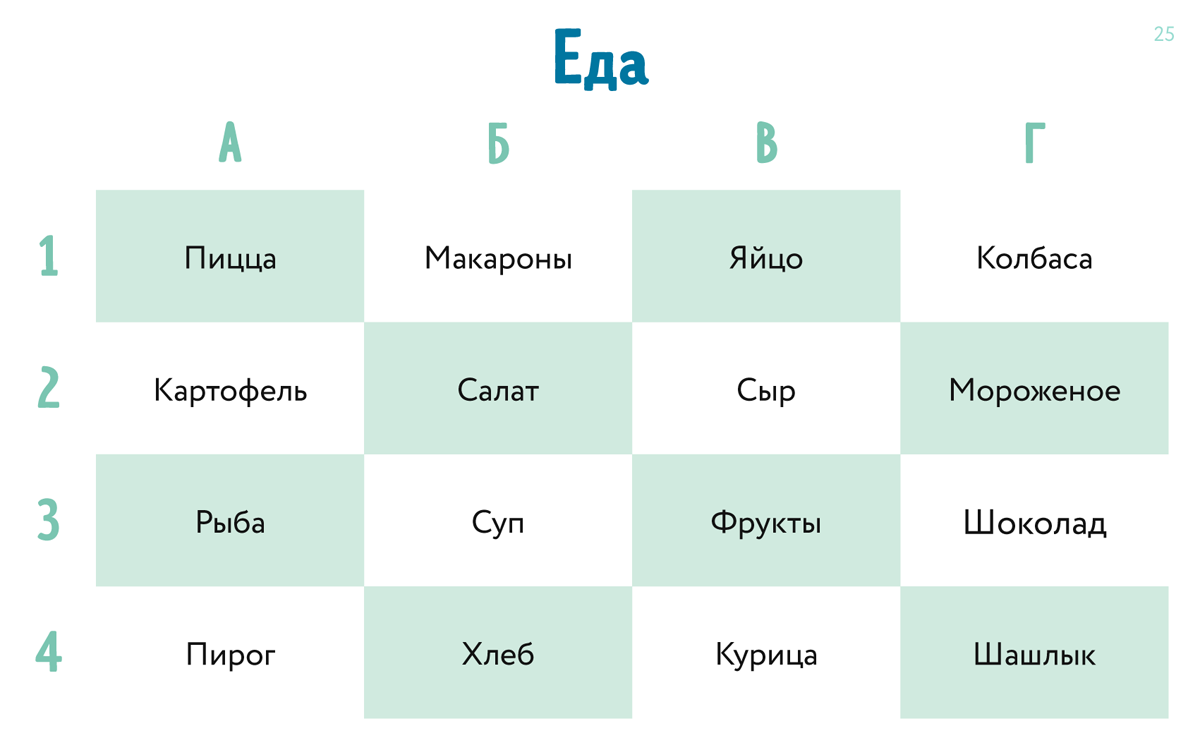
')
2-6 players know what word is made up with it, but one does not know. You need to name one by one association so that everyone else understands that you are among those who know the word. Then, when everyone calls by the word, there will be a discussion. The task is to find someone who does not know what that word was. That is a hare.
A safe strategy for a player who knows a word is to pick up a certain exclusive feature that will help to precisely cut off only one word in this group. For example, the word "Doctor" in this situation quite successfully ends the game. Because the words of the masculine and neuter gender are hardly suitable here - that is, only doctor pizza, doctor sausage, doctor fish and doctor chicken remain.
Unfortunately, a 100% safe strategy is also a way to lose.
Because the hare wins in two cases:
That is, the players' task is to show that they know the word, but not to call it.
The task of the hare is to show first that he knows the word, and then, if it did not work out, to recognize him.
In our example, the first player said "doctoral." Then he almost exactly gave the hare a victory by method 2, but at the same time covered his ass.
If the first player did so, all the players except the first are under suspicion. From himself, he removed the suspicion, but that did not help win. That is, in the general case, the search for an excluding descriptor for each word is not a strategy that is worth using if the goal is to win.
What happens if you try to use a wider range? For example, "flour". This is pizza, pasta, pie, bread. Will this help the rest of the players? Yes, it will clearly show that you know the word (well, or you are lucky with a probability of 25%, since there are 4 out of 16), but at the same time you will not clearly indicate this word.
What will happen if we name a wide range with different strength of associations? For example, "boiled". Boiled fish, boiled sausage and boiled chicken. It seems that the logic fits all three, but in our cultural code this will be a slightly stronger indication of a chicken and a slightly weaker indication of a sausage. So you can enter the hare into error.
We write: a good strategy is to call an association that is related to a given word, but not obvious.
What else do we have? Shared context. That is, you can use associations that will not all understand, but only one or two players. For example, for someone “Italy” is a series of pizza and pasta. I know that in the test group there still gets ice cream, because I did Sophie’s quest to catch a pickpocket near an ice cream shop in the square where evil policemen knocked the Chinese from the fountain. This means that I’ll mislead the hare by association “Italy”, and at the subsequent discussion Sophie will confirm that I knew about ice cream. Well, or I can remind her with the word “pickpocket”, passing additional information after the fact in the discussion (that is, without affecting the hare's course).
That is, there are three strategies:
If he goes first, choose the widest possible conceptual row on the card (but not completely covering it) and find the descriptor that describes everything in this row. Preferably, quickly, focusing on the naming of the word as the first player in previous games.
Here is a card, what can be called here?
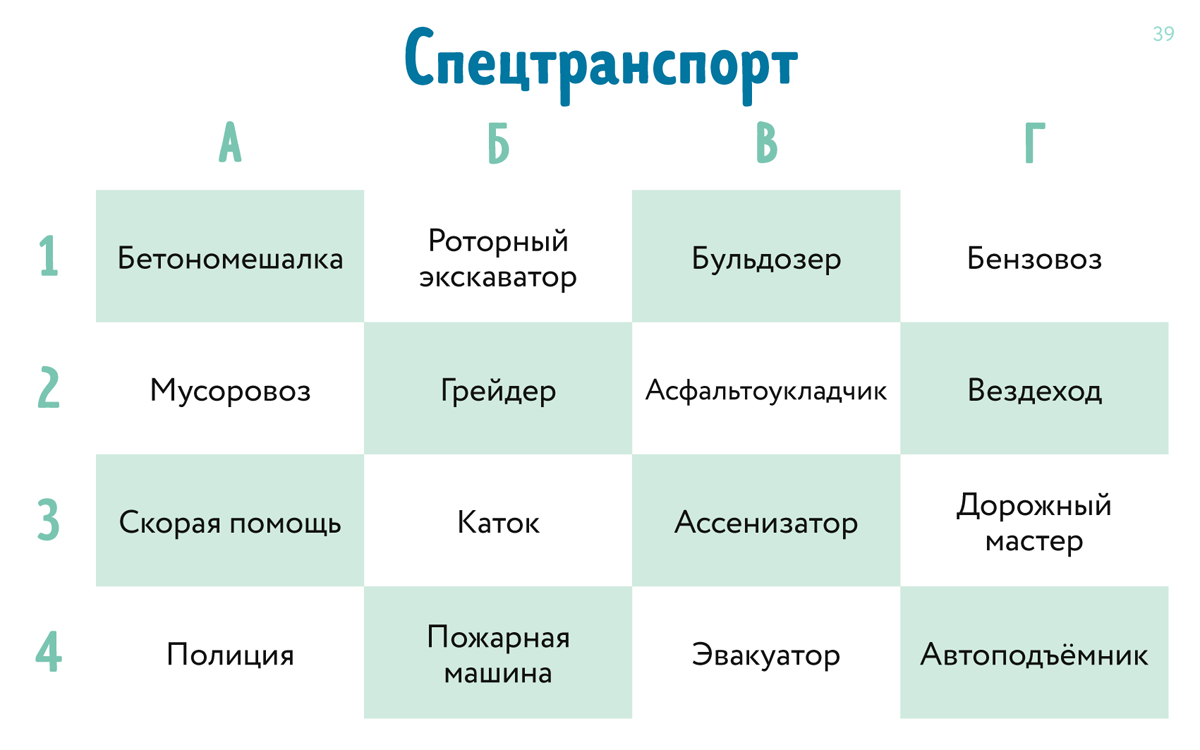
The hare calls the "flasher" - he points to the ambulance, the police and the fire engine, but then in the discussion he can put forward the argument that, in fact, even on the paver there should be a flashing light on the traffic rules 3.4.
He can say “cudgel”, which will definitely indicate to the construction equipment and other things, where in the city they are used to seeing guest workers. Here it is based on the cultural code: it is very convenient, because it creates a blurred area boundaries. For example, a garbage truck is suitable or not - this is the subject of discussion.
And so on. It is not very beneficial to him to narrow the area.
Accordingly, if he walks second, he must understand what area the first player has covered with his association - and try to cover it with its own (maybe without one word).
Card:
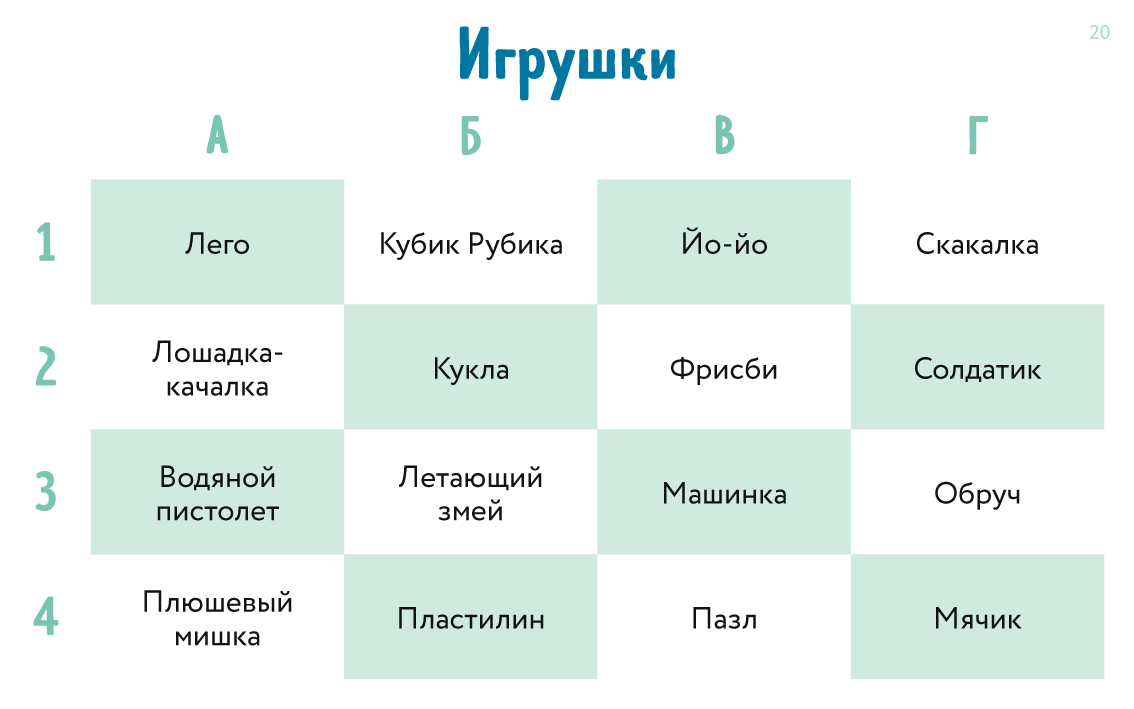
The player says: "Wind." This is immediately such an area:
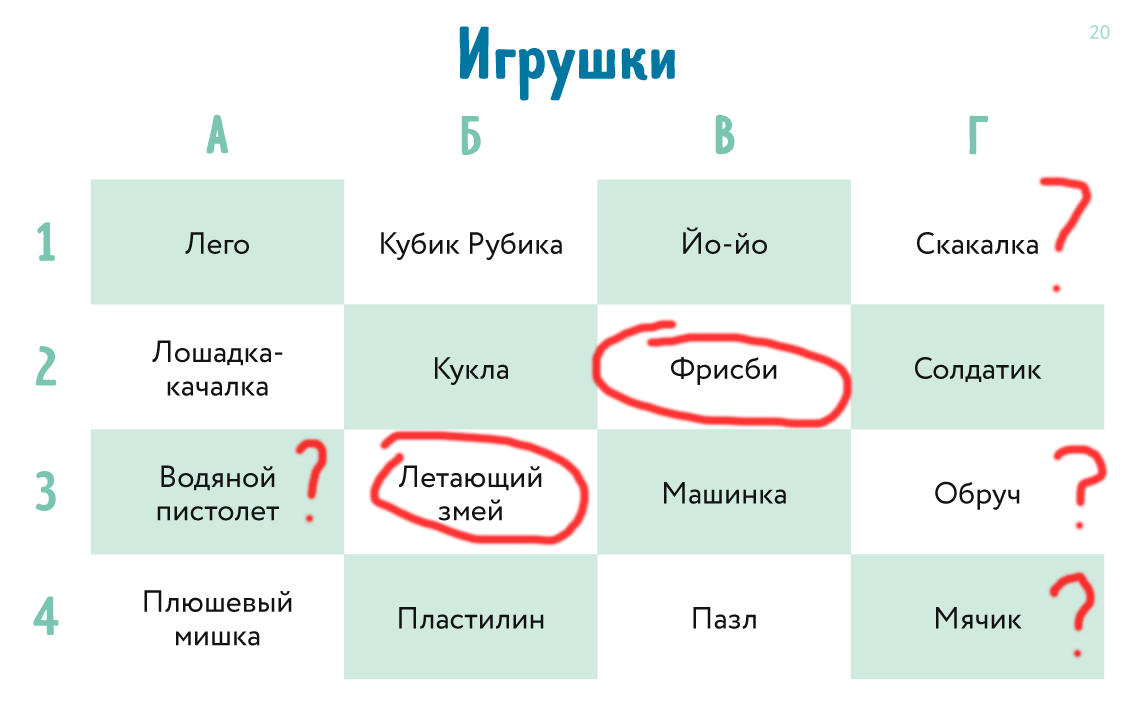
In the sense that two explicit words and a bunch of which can be pulled in the discussion behind the ears. The next player says "thread". Khoba:
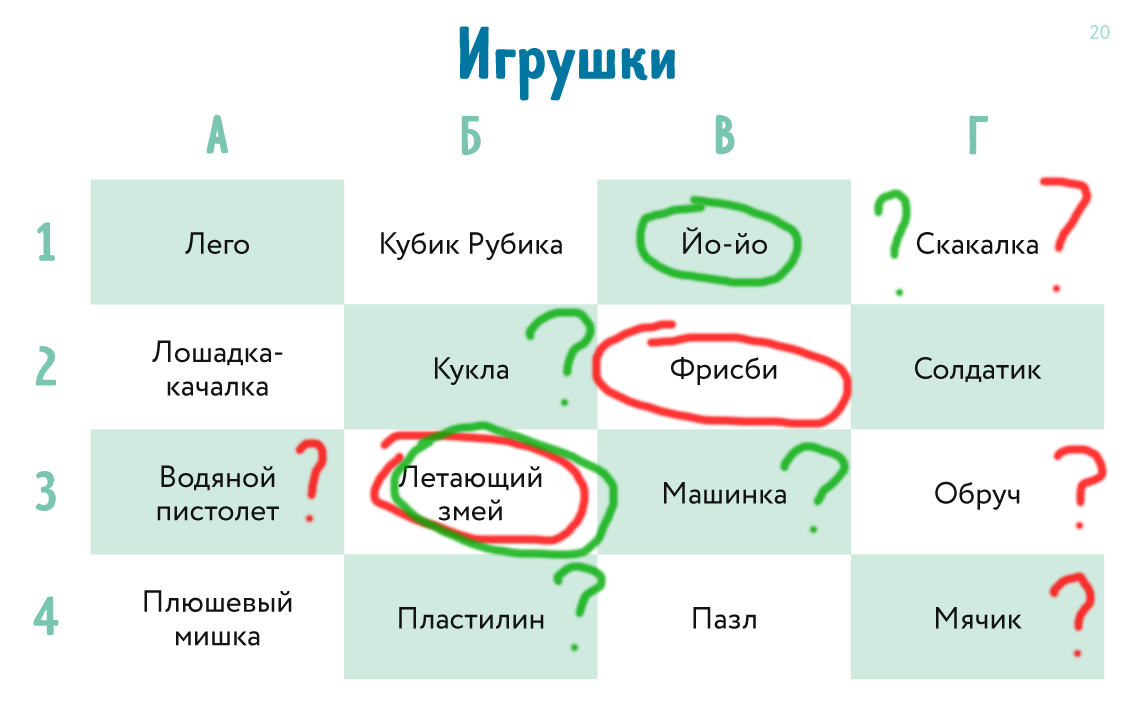
The third says: "top to bottom." So, it seems, we have a hare. Because everything has a top and a bottom, and then it can be attracted to the discussion.
Fourth: Invasion. Oops. Another candidate for the hare.
Fifth: China. Also a very general category, because all this can be done in China. By the way, if it was a hare, then a damn good move, because the word "China" can be pulled out in any direction during the discussion.
So, in the worst scenario, the hare went first, covered most of the words with the card by association, but did not hit (because there was something rare). Then he received several sets of sets with words, crossed them, and realized that either 2-3 words were output, or part of the sets did not intersect, that is, someone used associations that were not available to him.
In a good scenario, the hare himself walked closer to the end and could name something ambiguous, but covering the intersection of areas.
The purpose of the hare - otmazatsya or learn the word. For this, he is silent and listens to the arguments of the other players. Quite possibly, some of the sets will be reduced, and then he will have a solution.
If he already knows the word, it means that he did not lose. But it makes sense for him to try to win, that is, to make it so that someone called him a hare. Now his strategy is to use other people's mistakes. Accordingly, he chooses the weakest or widest association and attacks her.
In our case, it is obvious that the players with string and wind knew that it was made by a flying serpent. Remained versions of "top-bottom", "Invasion" and "China". Players ask: why, actually, the Invasion? Answer:

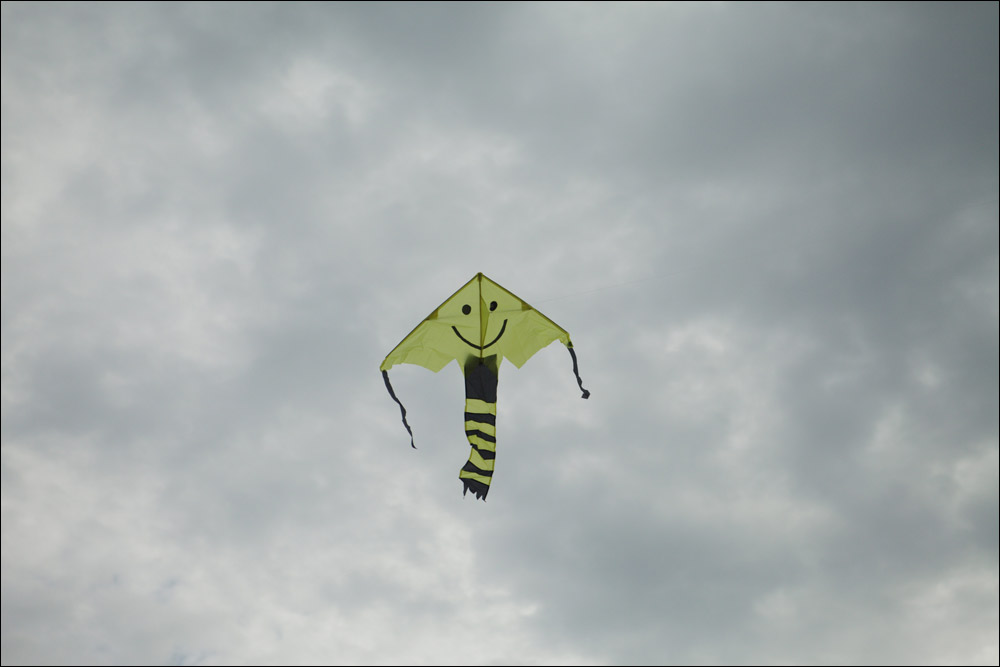
And then player 2 stands up for player 4: “I remember what was there. Yes, it does. ” Since player 2 is not under suspicion, it is worth believing. Probably.
It remains the "top-bottom" and "China." We continue to find out. With China, too, everyone understands: "This is what they often do there in the squares":

Player 3 ("top-down") starts to get to the bottom of player 4 ("Invasion") about the weakness of the association.
Go to the final.
So we know that:
Factor (3) is inaccurate, because any player suspected of hare will do exactly the same thing. Because his task is to win, and he will attack the one whom he suspects. Because firmly in his innocence.
Factors (1) and (2) relate to the first layer of the logic of rational players.
And then it all depends on the associations and hacks. Someone on the discussion may show that he consciously replaced the gender in the first association. Someone turned to the other player's experience (context). Someone gave an association to an association and so on. The hare can safely be charged for someone, then they will believe that he knows the word.
In our case, the hare is clearly the one who said “top-down”, but a bundle with the local experience “Invasion = the Serpent” could play a bad joke if the player able to confirm the alibi himself would be a hare. In general, the mini-mafia round is over.

Voting
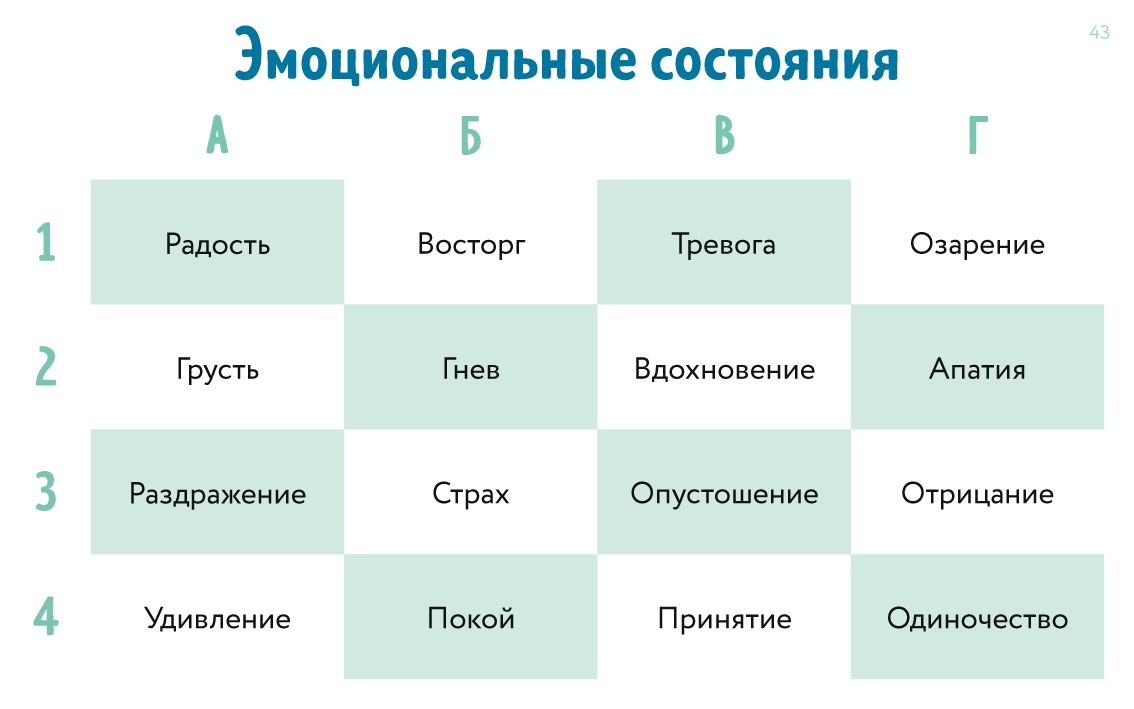
Associations:
Here and then we played according to the tournament rules, that is, we took 3 minutes to read the card and think it over, but did not give a pause between words for more than 10 seconds. Obviously, the hare did not make it to the number 5, but the third player burned the hare association. The discussion will lead to almost nothing, because the hare already knows the word.
Conflict: by the way, in theory, by the way, you can even repeat the word for someone, “because I made such a statement in advance,” but this is already a hard fawn. Therefore, a good player must think out the second word. Like a real paranoid.
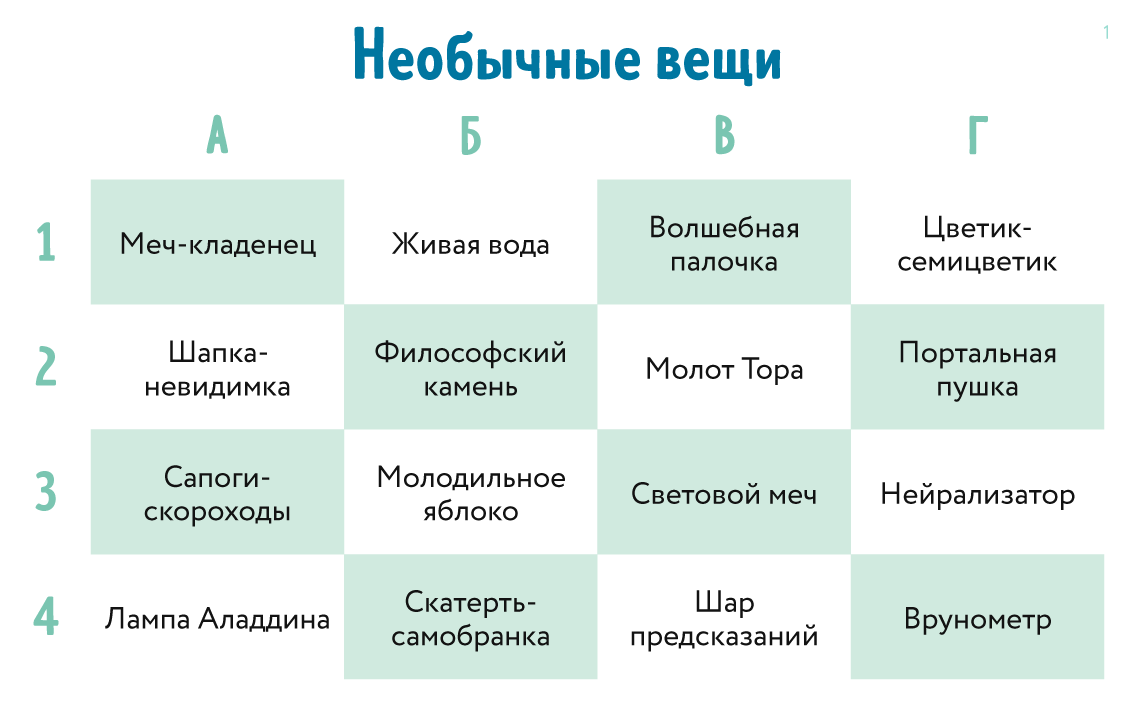
Associations:
Since this was the "Rejuvenating Apple", the hare stupidly did not fall into the category, walking first. At discussion, the best strategy is not to say anything, but vote immediately. So he will decrease the probability to guess the word.
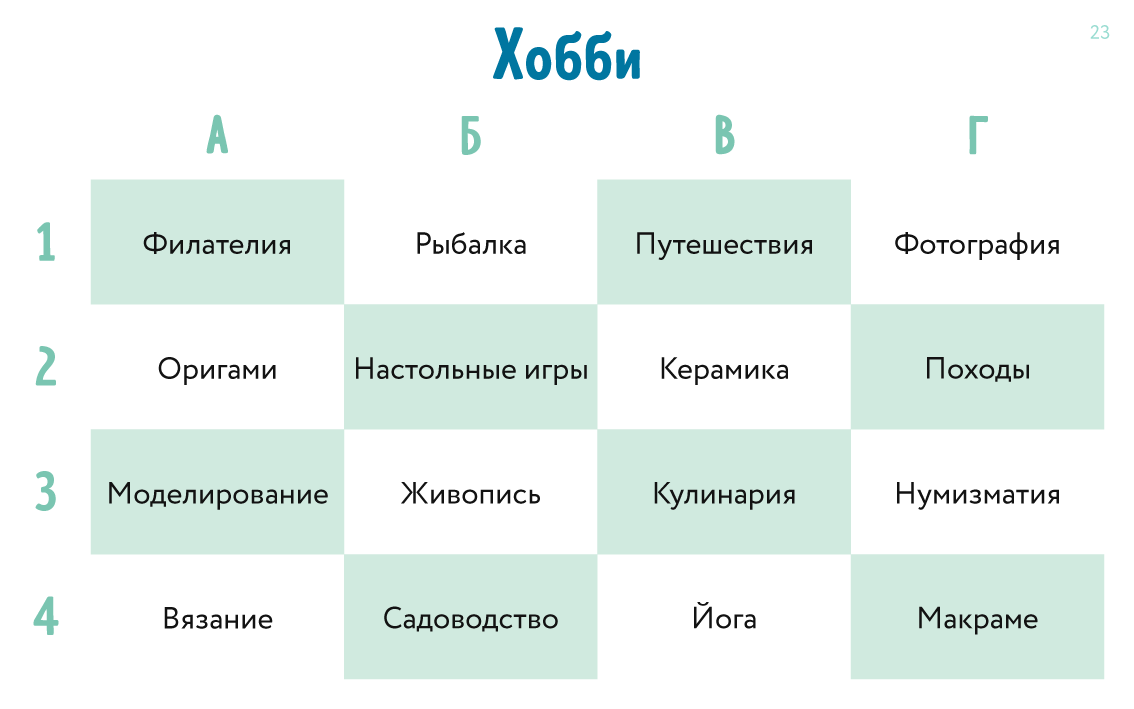
Associations:
The word "gardening." Hare was me. He called the "Collection" as a general marker for almost everything, and almost even shoved the honorary right to be a hare to the Vkontakte player, but he had a common context with another young player. I did not understand him and did not guess the word.
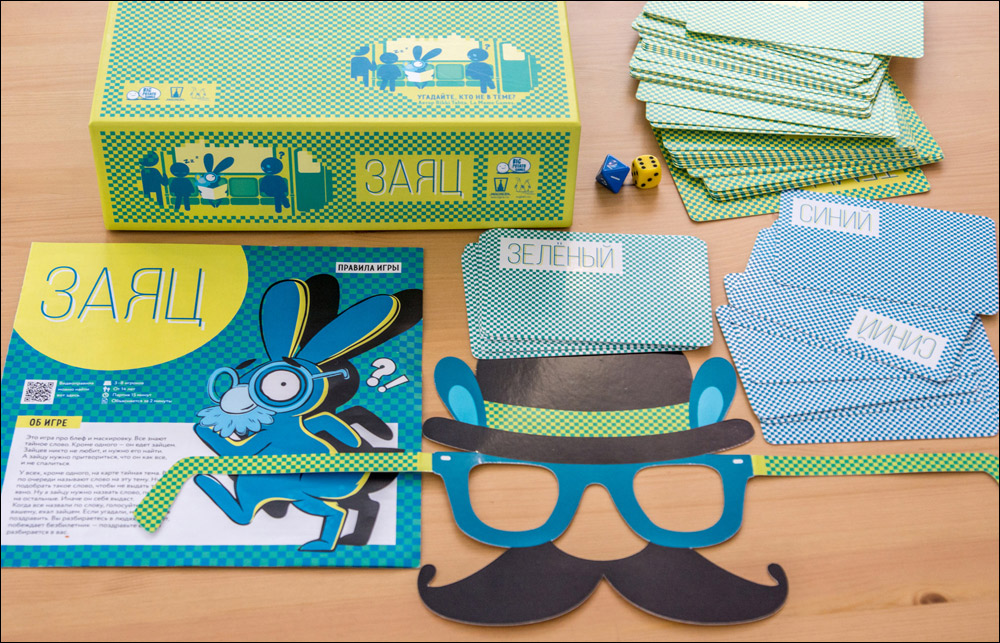
Equipment
So, we just walked through the game and saw what the optimal strategies for which players work. Generally, arming ourselves with a similar apparatus, we approach every game we play: someone consciously, and someone already semi-automatically based on experience. This should be done not only for victory, but also for the ability to balance the game.
It looks like reverse engineering.
The result is a rather unpredictable discussion with a lot of variables and very good leveling of both logic and the negotiating layer. The closest analogue (simpler) Hare - beautiful " code names ." The question was whether it was worth taking a Chameleon license (mechanic hare) - or “Codenames” is better. So, I can say that the Hare is much richer, funnier and brighter. Analysis was needed to understand the potential of mechanics. As a result, we decided to take a license and publish the game in Russia. Actually, what happened, you can see here .
But from the point of view of development, the auto-balancing algorithm is very good here (feel the developer’s steps behind it):

On tests, we tried to make masks for those who slept like a hare. They brought into the next batch a healthy suspicion for the same person (since it is more difficult to read facial expressions) and a bunch of selfies. Entered in the final box.
Now you know about how to play, and if you want to play on the road with a piece of paper and a pen, here’s another idea that you can do atypically. You will need matrices of words on one topic and sheets with a hidden word (and one without it) for distribution to players.
There is such a card:

')
2-6 players know what word is made up with it, but one does not know. You need to name one by one association so that everyone else understands that you are among those who know the word. Then, when everyone calls by the word, there will be a discussion. The task is to find someone who does not know what that word was. That is a hare.
A safe strategy for a player who knows a word is to pick up a certain exclusive feature that will help to precisely cut off only one word in this group. For example, the word "Doctor" in this situation quite successfully ends the game. Because the words of the masculine and neuter gender are hardly suitable here - that is, only doctor pizza, doctor sausage, doctor fish and doctor chicken remain.
Unfortunately, a 100% safe strategy is also a way to lose.
Why limit hypotheses in one word - the way to lose?
Because the hare wins in two cases:
- He was not found (that is, they chose another player as a hare during the discussion)
- Or the hare at the end of the discussion calls the hidden word.
That is, the players' task is to show that they know the word, but not to call it.
The task of the hare is to show first that he knows the word, and then, if it did not work out, to recognize him.
In our example, the first player said "doctoral." Then he almost exactly gave the hare a victory by method 2, but at the same time covered his ass.
If the first player did so, all the players except the first are under suspicion. From himself, he removed the suspicion, but that did not help win. That is, in the general case, the search for an excluding descriptor for each word is not a strategy that is worth using if the goal is to win.
What happens if you try to use a wider range? For example, "flour". This is pizza, pasta, pie, bread. Will this help the rest of the players? Yes, it will clearly show that you know the word (well, or you are lucky with a probability of 25%, since there are 4 out of 16), but at the same time you will not clearly indicate this word.
What will happen if we name a wide range with different strength of associations? For example, "boiled". Boiled fish, boiled sausage and boiled chicken. It seems that the logic fits all three, but in our cultural code this will be a slightly stronger indication of a chicken and a slightly weaker indication of a sausage. So you can enter the hare into error.
We write: a good strategy is to call an association that is related to a given word, but not obvious.
What else do we have? Shared context. That is, you can use associations that will not all understand, but only one or two players. For example, for someone “Italy” is a series of pizza and pasta. I know that in the test group there still gets ice cream, because I did Sophie’s quest to catch a pickpocket near an ice cream shop in the square where evil policemen knocked the Chinese from the fountain. This means that I’ll mislead the hare by association “Italy”, and at the subsequent discussion Sophie will confirm that I knew about ice cream. Well, or I can remind her with the word “pickpocket”, passing additional information after the fact in the discussion (that is, without affecting the hare's course).
That is, there are three strategies:
- Specify a group of words, but not exactly one word by a “covering” association.
- If there are good ideas, it is advisable to use implicit associations or associations with different strengths.
- If possible, actively use the general context between the players, which can be opened in the discussion.
What to do a hare?
If he goes first, choose the widest possible conceptual row on the card (but not completely covering it) and find the descriptor that describes everything in this row. Preferably, quickly, focusing on the naming of the word as the first player in previous games.
Here is a card, what can be called here?

The hare calls the "flasher" - he points to the ambulance, the police and the fire engine, but then in the discussion he can put forward the argument that, in fact, even on the paver there should be a flashing light on the traffic rules 3.4.
He can say “cudgel”, which will definitely indicate to the construction equipment and other things, where in the city they are used to seeing guest workers. Here it is based on the cultural code: it is very convenient, because it creates a blurred area boundaries. For example, a garbage truck is suitable or not - this is the subject of discussion.
And so on. It is not very beneficial to him to narrow the area.
Accordingly, if he walks second, he must understand what area the first player has covered with his association - and try to cover it with its own (maybe without one word).
let's try
Card:

The player says: "Wind." This is immediately such an area:

In the sense that two explicit words and a bunch of which can be pulled in the discussion behind the ears. The next player says "thread". Khoba:

The third says: "top to bottom." So, it seems, we have a hare. Because everything has a top and a bottom, and then it can be attracted to the discussion.
Fourth: Invasion. Oops. Another candidate for the hare.
Fifth: China. Also a very general category, because all this can be done in China. By the way, if it was a hare, then a damn good move, because the word "China" can be pulled out in any direction during the discussion.
Discussion when choosing a hare
So, in the worst scenario, the hare went first, covered most of the words with the card by association, but did not hit (because there was something rare). Then he received several sets of sets with words, crossed them, and realized that either 2-3 words were output, or part of the sets did not intersect, that is, someone used associations that were not available to him.
In a good scenario, the hare himself walked closer to the end and could name something ambiguous, but covering the intersection of areas.
The purpose of the hare - otmazatsya or learn the word. For this, he is silent and listens to the arguments of the other players. Quite possibly, some of the sets will be reduced, and then he will have a solution.
If he already knows the word, it means that he did not lose. But it makes sense for him to try to win, that is, to make it so that someone called him a hare. Now his strategy is to use other people's mistakes. Accordingly, he chooses the weakest or widest association and attacks her.
In our case, it is obvious that the players with string and wind knew that it was made by a flying serpent. Remained versions of "top-bottom", "Invasion" and "China". Players ask: why, actually, the Invasion? Answer:
- Well, you remember what we did there when the tent in 2012 went.2012 is far away, and we did almost everything there. Clarification comes:
- Well, when we still “Twister” stolen.Yeah, one in the company includes an association:


And then player 2 stands up for player 4: “I remember what was there. Yes, it does. ” Since player 2 is not under suspicion, it is worth believing. Probably.
It remains the "top-bottom" and "China." We continue to find out. With China, too, everyone understands: "This is what they often do there in the squares":

Player 3 ("top-down") starts to get to the bottom of player 4 ("Invasion") about the weakness of the association.
Go to the final.
Catching a hare
So we know that:
- The hare association will cover at least the entire multitude of words that were not excluded by past associations.
- The hare will not speak at the beginning of the discussion.
- The hare will try to actively attack another player in a late discussion.
Factor (3) is inaccurate, because any player suspected of hare will do exactly the same thing. Because his task is to win, and he will attack the one whom he suspects. Because firmly in his innocence.
Factors (1) and (2) relate to the first layer of the logic of rational players.
And then it all depends on the associations and hacks. Someone on the discussion may show that he consciously replaced the gender in the first association. Someone turned to the other player's experience (context). Someone gave an association to an association and so on. The hare can safely be charged for someone, then they will believe that he knows the word.
In our case, the hare is clearly the one who said “top-down”, but a bundle with the local experience “Invasion = the Serpent” could play a bad joke if the player able to confirm the alibi himself would be a hare. In general, the mini-mafia round is over.

Voting
Try a couple more times?

Associations:
- Hammock
- Vampire
- We only dream
- Silence
- Drooping
Here and then we played according to the tournament rules, that is, we took 3 minutes to read the card and think it over, but did not give a pause between words for more than 10 seconds. Obviously, the hare did not make it to the number 5, but the third player burned the hare association. The discussion will lead to almost nothing, because the hare already knows the word.
Conflict: by the way, in theory, by the way, you can even repeat the word for someone, “because I made such a statement in advance,” but this is already a hard fawn. Therefore, a good player must think out the second word. Like a real paranoid.

Associations:
- Tool
- Key
- Pluripotent stem cells
- Borjomi
- Dead man
Since this was the "Rejuvenating Apple", the hare stupidly did not fall into the category, walking first. At discussion, the best strategy is not to say anything, but vote immediately. So he will decrease the probability to guess the word.

Associations:
- Mint
- Granny
- Collection
- In contact with
- Country house
The word "gardening." Hare was me. He called the "Collection" as a general marker for almost everything, and almost even shoved the honorary right to be a hare to the Vkontakte player, but he had a common context with another young player. I did not understand him and did not guess the word.

Equipment
What was it
So, we just walked through the game and saw what the optimal strategies for which players work. Generally, arming ourselves with a similar apparatus, we approach every game we play: someone consciously, and someone already semi-automatically based on experience. This should be done not only for victory, but also for the ability to balance the game.
It looks like reverse engineering.
The result is a rather unpredictable discussion with a lot of variables and very good leveling of both logic and the negotiating layer. The closest analogue (simpler) Hare - beautiful " code names ." The question was whether it was worth taking a Chameleon license (mechanic hare) - or “Codenames” is better. So, I can say that the Hare is much richer, funnier and brighter. Analysis was needed to understand the potential of mechanics. As a result, we decided to take a license and publish the game in Russia. Actually, what happened, you can see here .
But from the point of view of development, the auto-balancing algorithm is very good here (feel the developer’s steps behind it):
- Players can not call absolutely accurate associations, and then pass the word to the hare. But they must show somehow that they know this word, perhaps, revealing the second layer of logic (up to the association on the association).
- This creates enough desire to find out what was meant, and sets the stage for discussion, where the hare can "talk" players.
- He can also be charged for someone or on the fly to come up with an explanation of his word, in general, to break other hacks and play a psychological game.
- Players can use the tips of psychology, watching others answer the questions.

On tests, we tried to make masks for those who slept like a hare. They brought into the next batch a healthy suspicion for the same person (since it is more difficult to read facial expressions) and a bunch of selfies. Entered in the final box.
Now you know about how to play, and if you want to play on the road with a piece of paper and a pen, here’s another idea that you can do atypically. You will need matrices of words on one topic and sheets with a hidden word (and one without it) for distribution to players.
Source: https://habr.com/ru/post/456844/
All Articles